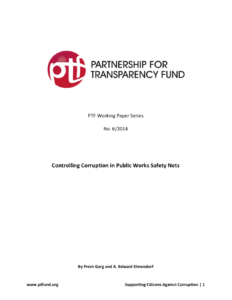
Many governments support publically-funded rural works programs to provide safety nets for the rural poor and to deploy the underused labor productively. It is estimated that developing countries spend over 10 billion dollars a year on such programs aiming to benefit over 100 million poor. Because of their decentralized nature with activities scattered over thousands of often remote work sites and with most potential beneficiaries not used to dealing with government bureaucracies, fraud and corruption are often a major risk in such programs.
PTF projects and activities combating corruption in rural works programs have been concentrated in India. PTF has provided nearly $320,000 in ten grants to five separate CSOs for projects aimed at corruption in Indian rural works programs. In addition, PTF has provided $166,000 in 7 grants to address corruption in joint rural employment and food distribution (PDS) projects. These projects often include training programs covering social audits, public hearing techniques, community score cards, and India’s Right-to-Information (RTI) law and its application.
PTF has achieved remarkable local-level results addressing corruption in the Mahatma Gandhi National Rural Employment Guarantee Scheme (MGNREGS) program in India. This paper reviews this experience and makes recommendations for future action.

